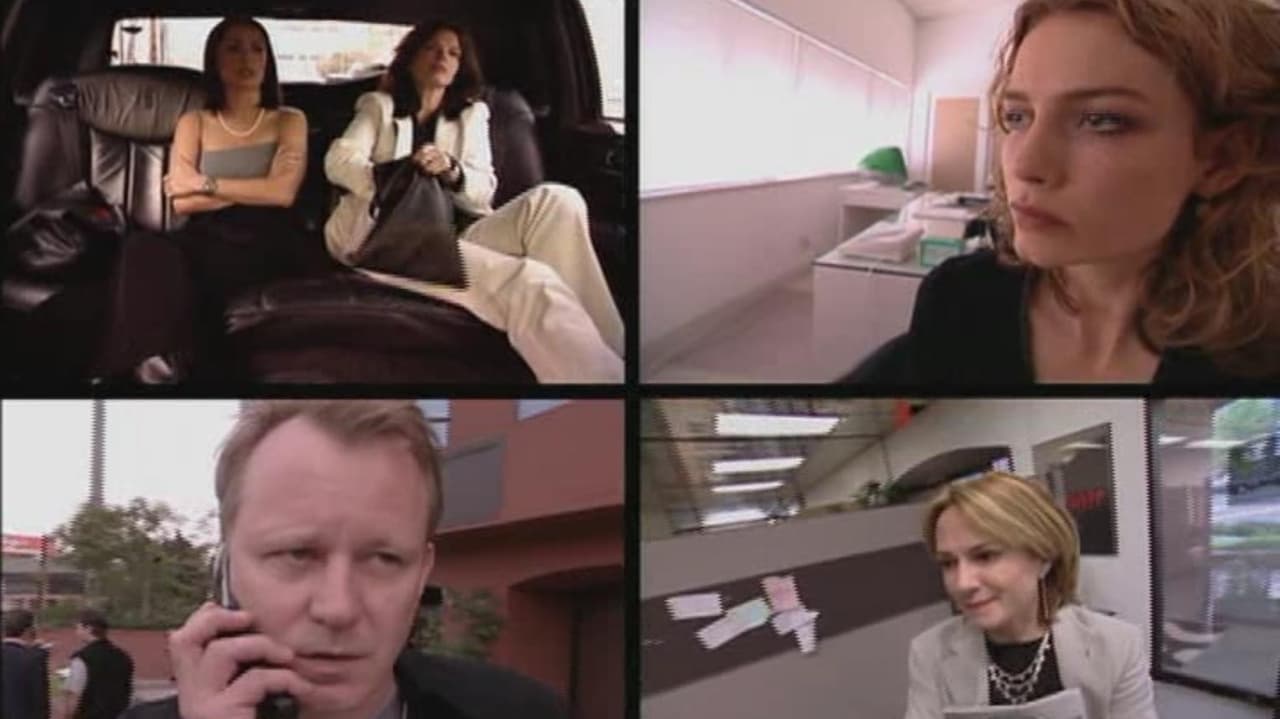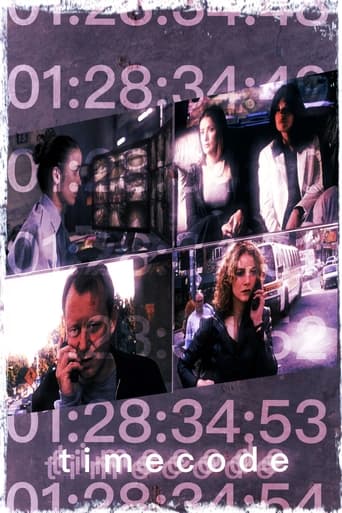



Please don't spend money on this.
It's an amazing and heartbreaking story.
Amazing worth wacthing. So good. Biased but well made with many good points.
View MoreStory: It's very simple but honestly that is fine.
Timecode (2000): Dir: Mike Figgis / Cast: Jeanne Tripplehorn, Salma Hayek, Stellan Skarsgard, Saffron Burrows, Holly Hunter: Focusing our attention becomes a big priority when one embarks on Mike Figgis's creation. Unique film in which its initial concept works against it. Four situations are presented in real time on screen blocked into cells. It is impossible to keep track of all of the action, however dialogue and noise usually gain an advantage. Director Mike Figgis details the film with a large ensemble cast as well as present his own personal project where viewers can decide what they wish to devote attention to. Among the cast is Jeanne Tripplehorn who acts out jealousy and lets the air out of her lover's tires. She will bug her purse and spend much of the film listening in on an audition, which will result in a fatal jealous rage. Salma Hayek plays her lover and she is off to an audition but Tripplehorn believes that she is cheating on her. Other than Tripplehorn and Hayek there is Stellan Skarsgard as a diverse member of the film crew whose projects contains an unexpected twist that is fatal. Saffron Burrows plays his wife who is planning a divorce. Holly Hunter steals moments as an executive. Figgis is setting out to make a film that is compelling and original. The challenge for the viewer is focus but it plays off several points of view. It is up to us where our attention will go. Score: 8 / 10
View MoreWhen split-screen cinema first became possible in the 1960s, it also became fashionable, with movies such as the original 'Thomas Crowne Affair' using it to prove just quite how hip and cool they were. But non-one, surely, has ever constructed a film as boldly as Mike Figgis has 'Timecode', a movie in which the narrative is told in four separate panels at all times. And it's not enough to concentrate on just one either: there's always something of note going on in at least two panels (and which two varies continuously), which kind of begs the question, just how much of your brain to do you use when watching a conventional movie? Or alternatively, how many brains do you have? Certainly, watching 'Timecode' is never a relaxing experience, but Figgis does some things to make our lives easier: with the remarkable soundtrack, for example (the director even composed some of the songs on it) and the way that the aural focus shifts between the segments; or the fact that each segment is shot without any cutting. In some ways, this latter fact is the most surprising of the movie: who can make a movie without cutting? and yet, in pulling this off, Figgis actually comes some way towards the justification of his wider structure. For telling four stories at once brings sufficient (OK, maybe excessive) busyness to allow each story to be told in real time, often a holy grail of drama but rarely achievable (unless you want Jack Bauer ridiculousness or 'Big Brother' tedium). But aside from the structure, is it worth watching? This is a harder question to answer, it's very hard to put the form of the movie out of your mind when watching it, but I was moved in the end. And while the film may have been simply too extraordinary to set any trends, it deserves much credit for its unique blend of audaciousness and skill.
View MoreAs I sat down to watch this movie I was cursing because I couldn't find the remote. Lucky break for me! After a few minutes of uncomfortable misgivings, I mean! 4 screens of hand-held camera with weirdly variable sound - Oh God, what am I watching here? I slowly became hooked and hypnotised. I would suddenly realise that I had been so intent on the top left corner that the situation in the bottom right had changed from an interior with one character to an exterior following another and I hadn't noticed when and how this had happened. If I had the remote I would have been constantly stopping and rewinding and I would have totally destroyed the flow.So, here's the thing thing. If you are watching this movie for the first time on DVD or VHS - loose the remote control! Not a Great Film but an interesting and noble experiment. (And heartening to know there are still some grown-ups left in Hollywood).
View MoreI began watching "Timecode" with a few friends; one bailed part way through, calling it a glorified soap opera. I stuck it out to the end, but even though some of it was not typical daytime fare, overall I thought the criticism was deserved. I found it difficult to identify with or feel empathy for the stock aspiring actress characters; the random masseuse was clearly the most enjoyable of an otherwise bland set of individuals. The interesting twist in filming with four simultaneous cameras was interesting, but the banality of the storyline- cheating lovers and the toll it takes, dreams of big screen success, inter-office tensions- detracted from the innovative idea. Trying to keep track of all four frames at once was a sort of mental aerobic, probably working those muscles you develop from listening to Mozart as a baby, but the plot just didn't seem worth it. The attempt at realism was checked by the fact that there was always only one frame in which important action was taking place; at times it seemed they might as well have just cut the superfluous cameras. Anyway, not sure if I'd recommend it; it's a challenge to keep track of, but not quite worth the extra effort over simply watching a movie.
View More